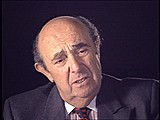You searched for: ���������������������������������������������fuk7778���your
<< Previous | Displaying results 31-40 of 163 for "���������������������������������������������fuk7778���your" | Next >>
-
The White Rose Opposition Movement
ArticleThe White Rose, led by students including Hans and Sophie Scholl, was an anti-Nazi group during WWII. Its members spread leaflets denouncing the regime.
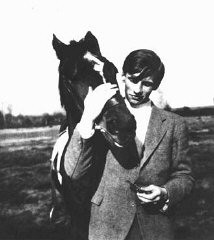
-
Alfred Kerr
ArticleGerman Jewish writer Alfred Kerr was a well known theater critic during the Weimar period. His works were burned during the Nazi book burnings of 1933.
-
Kurt Tucholsky
ArticleKurt Tucholsky was a German satirist who criticized the Nazis during their rise to power. In 1933, his works were burned under the Nazi regime. Learn more.
-
Life After the Holocaust: Aron and Lisa Derman
ArticleAfter WWII and the fall of the Nazi regime, Holocaust survivors faced the daunting task of rebuilding their lives. Listen to Aron and Lisa Derman's story.
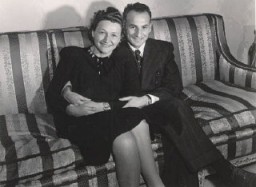
-
Poster promoting the Nazi monthly publication Neues Volk
PhotoPoster promoting the Nazi monthly publication Neues Volk. Jews were not the only group excluded from the vision of the "national community." The Nazi regime also singled out people with intellectual and physical disabilities. In this poster, the caption reads: "This hereditarily ill person will cost our national community 60,000 Reichmarks over the course of his lifetime. Citizen, this is your money." This publication, put out by the Nazi Party's Race Office, emphasized the burden placed on society by…
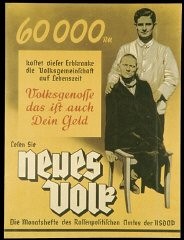
-
Leon Senders
ArticleRead the Jewish Partisan Educational Foundation's short biography of Leon Senders.
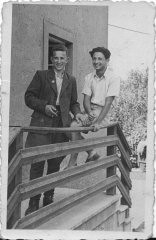
-
Letter from Esther Lurie regarding lost art, 1945
DocumentThis document is one page of a letter from artist Esther Lurie, written after the war, asking for help in following down leads and locating the artwork she had created and hidden while imprisoned in the Kovno ghetto, Lithuania. She wrote, "The matter concerns a collection of 200 pen-and-ink drawings representing scenes of ghetto life which I made during my internment in the Kaunas Ghetto (Lithuania) in 1941-1944. I left the drawings buried in the earth as I felt that I had no hope of survival."
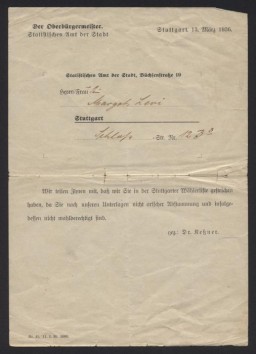
-
Leah Hammerstein Silverstein describes working under a false non-Jewish identity in a German hospital in Krakow
Oral HistoryLeah grew up in Praga, a suburb of Warsaw, Poland. She was active in the Ha-Shomer ha-Tsa'ir Zionist youth movement. Germany invaded Poland in September 1939. Jews were forced to live in the Warsaw ghetto, which the Germans sealed off in November 1940. In the ghetto, Leah lived with a group of Ha-Shomer ha-Tsa'ir members. In September 1941, she and other members of the youth group escaped from the ghetto to a Ha-Shomer ha-Tsa'ir farm in Zarki, near Czestochowa, Poland. In May 1942, Leah became a courier…
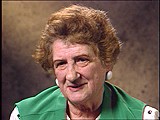
-
Barbara Ledermann Rodbell describes receiving her first set of false papers
Oral HistoryIn 1933 Barbara's family moved to Amsterdam, in the Netherlands. They became friends of Anne Frank and her family. The Germans invaded the Netherlands in 1940. Barbara's boyfriend, Manfred, had underground contacts and she got false papers. Her mother, sister, and father were deported to Westerbork and then to Auschwitz. Barbara survived using her false papers and worked for the resistance. She helped take Jews to hiding places and also hid Jews in an apartment held in her false name.
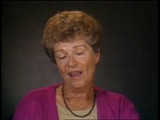
-
William (Bill) Lowenberg describes the importance of bonds of friendship among young people imprisoned in the Westerbork camp
Oral HistoryAs a boy, Bill attended school in Burgsteinfurt, a German town near the Dutch border. After the Nazis came to power in Germany in January 1933, Bill experienced increasing antisemitism and was once attacked on his way to Hebrew school by a boy who threw a knife at him. In 1936, he and his family left Germany for the Netherlands, where they had relatives and thought they would be safe. However, after Germany invaded the Netherlands in May 1940, antisemitic legislation--including the order to wear the Jewish…
